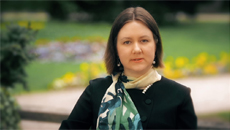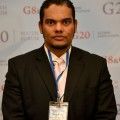Speakers
Dr. Vladimir Vasilev

Rector, Saint Petersburg National Research University of Information Technologies, Mechanics and Optics
Vladimir Vasilev graduated from the St. Petersburg Polytechnical University (then Leningrad Polytechnical Institute) in 1974. He received his Ph.D. from the same school in 1980. In 1983 Vladimir Vasilev joined the St. Petersburg State University of Information Technologies, Mechanics and Optics (hereafter the University ITMO, then the Leningrad Institute of Fine Mechanics and Optics). In 1989 Dr. Vasilev successfully presented his habilitation thesis (Dr. Sc.) and took the position of a full professor in 1990. In 1991 Prof. Vasilev initiated the organization of a chair of Computer Science, which he has headed ever since. Since 1996 Prof. Vasilev is serving as a rector of the University ITMO. He has been elected for three in appointments a row of five years duration each.
Vladimir Vasilev is a prominent figure in the Russian academic landscape. In recognition of his organizing and reforming effort in 2004 he was elected and currently serves as the chairman of the Council of Rectors of St. Petersburg universities as well as a vice president of the Union of Rectors of the Russian Federation .
Prof. Vasilev has received a number of awards (2000, 2002, 2003, 2008) from the government and the President of Russian Federation for development of innovative approaches for training future generations of high-tech specialists.
Dr. Nikolai R.Toivonen

Vice-President for Innovations, Saint-Petersburg National Research University of Information Technologies, Mechanics and Optics (NRU ITMO)
Nikolai R.Toivonen is Vice-President for Innovations, Saint-Petersburg National Research University of Information Technologies, Mechanics and Optics (NRU ITMO). His responsibilities include strategic development of the University (including foresight of science and technology), enhancement of R&D management, technology transfer and commercialization (especially creation of spin-offs), international cooperation.
He has over 20 years of experience in project management, networking, and fundraising in the fields of education, research, and innovation, with emphasis on international challenges. During these years he had held different academic and administrative positions.
Prior to his work in NRU ITMO he led the Directorate of the “Innovative Educational Program” funded within the Priority National Project “Education” and Directorate on Project Management in Education in Saint-Petersburg State University (2005-2008).
Since 1994 he had held the position of Vice-President for International Relations in Petrozavodsk State University for over 10 years. During this period of time he developed concept and headed Northern European Open University, the set of information and consulting offices (representatives) in the Republic of Karelia (Russia) including those of the EU, the Nordic Council of Ministers, the Barents Region, and Canada.
Nikolai R. Toivonen gained his PhD in Mathematics and Physics from the Leningrad State University (now Saint-Petersburg State University), Department of Physics, in 1989; his specialization is “Quantum Mechanics”.
Jenny Mikakos

Member of the Parliament of Victoria, Australia
Jenny is Shadow Minister for Children and Young Adults, Shadow Minister for Youth Justice and Shadow Minister for Seniors and Ageing. She is a member of the Australian Labor Party which is currently the main opposition party in Victoria and is the government party in Australia’s national (federal) parliament. Her portfolios cover early childhood education, youth affairs and youth justice issues.
Jenny was elected to the Parliament of Victoria in 1999 and represents the Northern Metropolitan Region, which covers one fifth of Melbourne from its Central Business District northwards to its outer northern suburbs. She is a member of Victoria’s Legislative Council which is equivalent to a State Senate in the United States. It is an elected body with members elected via proportional representation for 4 year terms.
From 2007 until November 2010, Jenny was Parliamentary Secretary for Planning. From 2002 till 2007 she was Parliamentary Secretary for Justice. Before being elected to Parliament, Jenny was a lawyer for a number of prominent national legal and accounting firms.
Jenny obtained Arts and Law degrees from the University of Melbourne.
Peter Vogel

Founder and CEO of HR Matching AG, PhD student, Ecole Polytechnique Fédérale de Lausanne, Switzerland
Peter Vogel, a 28 year old native Austrian-American growing up in Germany and Switzerland, has studied mechanical engineering and medical engineering at the ETH Zurich and the Georgia Institute of Technology.
In May 2009 he started his PhD at EPFL in the field of entrepreneurship, investigating government programs in various countries, which help unemployed individuals transition into self-employment. He closely collaborates with labor market organizations around the world to help them improve existing programs. As part of his newest project, The Entrepreneurs’ Ship, he will continue this research in developing and emerging countries. HR Matching is headquartered in the 'Quartier de l'Innovation' of EPFL and includes brands such as the European career community Jobzippers, the Jobzippers Speakers Series and the non-profit organization ‘Stipendia International’. Since 2011 Peter has become the youngest Partner of the global HR experts’ network, the Futurework Forum. As part of this network, Peter is involved in workshops and courses, in particular related to recruitment of the next generations and how the workplace has to change in order to retain these talents. Since July 2011, Peter is working as entrepreneurship consultant, teacher and coach at the King Abdullah University of Science and Technology (KAUST) in Saudi Arabia. He developed a strong network and in-depth market knowledge of the MENA region.
He is a think-tank member of the World Entrepreneurship Forum, the World Economic Forum Global Shapers Community and the Sandbox Network. He has been speaking at TEDxLausanne on Youth Unemployment and Entrepreneurship.
Maneesh Kumar

Lecturer, Cardiff University, United Kingdom
Maneesh Kumar is a Lecturer at Cardiff Business School, Cardiff University. His degree includes PhD from the University of Strathclyde, Masters in Research from Glasgow Caledonian University and B.Tech in Manufacturing Engineering from Ranchi University, India. He is an active member of ASQ, EUROMA, LERC, and BAM. Maneesh’s research and publications are in the area of Lean Six Sigma (LSS), Agility, and Sustainable Supply Chain Management for both public and private sectors.His research outputs includes an edited book, five edited conference proceedings, two book chapters, twenty six peer reviewed journal publications, forty two conference papers, and six white papers. He serves on the Editorial Board of three journals. He has been involved in delivering Lean Six Sigma (LSS) training up to Black Belt level and delivered several workshops on LSS application in different types and sizes of industries including Kwik-Fit Insurance Services, Standard Life, Bakkavor Group, Norbert Dentressangle, NHS Grampian, NHS Sheltand, Edinburgh City Council, Aberdeenshire Council, and Tata Motors. He is also a regular speaker at International Conferences and Seminars on LSS & Process Excellence. He is actively involved in LSS research within Public Sector organizations such as NHS and City Councils.
Runhui Lin

Professor, Nankai University, China
Dr. Runhui Lin, is a Professor in organization and management of Business School, Nankai University, China. He is the Deputy director of Office for International Academic Exchanges, Nankai Univ. and associate director of Selten Laboratory of Nankai University (Named after and supported by Nobel prize winner Reinhard Selten and devoted in the researches on experimental economics and management). He is also a visiting scholar at Harvard University(2004-2005), member of several academic associations both domestic and abroad, like Academy of Management(AOM), Association for Information Systems(AIS), researcher of several academic institutes and adviser of several corporations including UFIDA (UFsoft) Software Co. Ltd. He serves as the peer reviewer of National Natural Science Foundation of China (NSFC),AOM annual meetings and some top management journals in China. He received his Ph.D. in Management Sciences. His research focuses on network organizations and governance, corporate governance, technology and innovation management, system analysis of complex organization systems and management systems, and network analysis methodology. He has published over 50 papers and 6 books in Chinese and English in the above fields. He taught MBA students “Information technology management” in English and “E-business in China” for the students from Minnesota Univ.(USA), Bryant University(USA), and Moscow International Higher Business School(MIRBIS, Russia) etc.
As a professor in organization and management of Business School, Nankai University, Dr. Runhui Lin, devoted himself more than ten years in studying network governance, corporate governance, IT governance and innovation governance in and among enterprises and organizations. He is an active researcher and has published widely home and abroad in the above fields. Also as the deputy director of Office for International Academic Exchanges, Nankai Univ., he worked fruitfully and gained rich experience in promoting collaboration among higher education institutes and international mobility of university students.

























































































































































































































































































